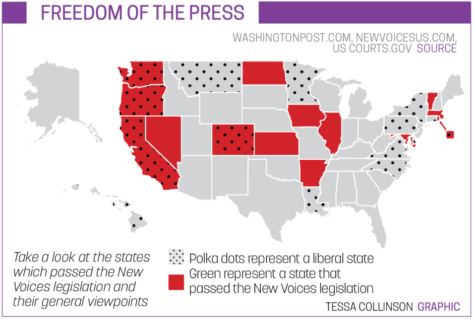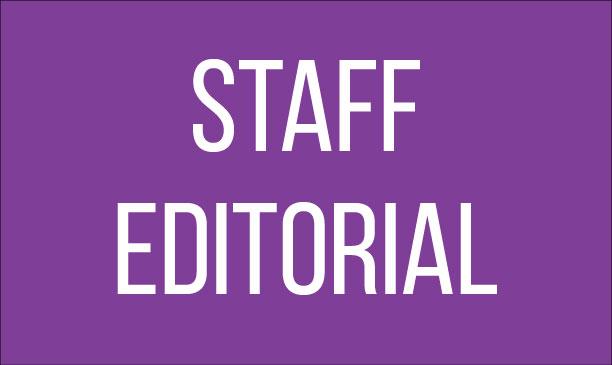In 2017, it failed. in 2018, it failed again. but in 2019, if we make a strong case to our representatives, House Bill 1130 may finally pass and finally restore freedom of the press to student journalism in Indiana’s schools.
HB 1130, known as the “New Voices” bill, would provide scholastic journalists the same rights guaranteed by the First Amendment of the U.S. Constitution: the right to publish any story we view as important to our community. While the Tinker v. Des Moines U.S Supreme Court decision in 1969 guaranteed these rights for students as well as adults, in 1988 a new decision—Hazelwood v. Kuhlmeier—overrode aspects of Tinker and specifically limited student journalists’ rights. After the Hazelwood decision, policies like prior review, which allow administrators to censor their school newspapers for a variety of reasons, became commonplace in scholastic journalism programs.
Journalists are not a PR team who publish stories solely to make schools look good; rather, we work to find important stories and tell them as objectively and accurately as we can—a right that currently applies to professional journalists and should apply equally to us. But prior review, and the threat of administrative censorship, severely limits the abilities of scholastic journalists’ in the United States.
Though many schools suffer from censorship policies like prior review, thankfully the HiLite is lucky to enjoy these free press rights solely due to the supportive nature of our administration. Current Principal Tom Harmas and Superintendent Michael Beresford, as well as many Carmel administrators before them, have consistently supported the HiLite and we truly appreciate their efforts. In fact, former Principal John Williams testified on behalf of the New Voices bill in 2017, despite opposition from the Indiana Principals’ Association. Even with the Hazelwood decision, we have been fortunate to publish stories that may have been censored at many other schools, including stories about sex education, controversial political stories and mental health policies. This trust between the HiLite and our administration—trust in our abilities to cover these topics sensitively and accurately—is something we deeply appreciate and hope to maintain in the future.
To be clear, this bill is still relevant to CHS—unless New Voices passes and solidifies our rights legally, there will always be an inherent risk in covering sensitive topics; without legal protection, administrators here, should they choose, could legally implement a policy of prior review, and there is little that could stop them. However, this issue is more relevant for the 1,925 other Indiana high schools that may be subjected to frequent censorship from their administrations. With this in mind, it is imperative to promote New Voices to improve scholastic journalism throughout our state, allowing schools with less understanding administrative staffs to have the same autonomy in selecting the topics they cover like the Hilite does.
Earlier this month, the HiLite earned its seventh consecutive National Scholastic Press Association (NSPA) Pacemaker Award—often called the “Pulitzer Prize of scholastic journalism”—at the NSPA’s national convention in Chicago. We hope these accolades exemplify how students can maintain a tradition of responsible journalism, and we hope to serve as a model for other schools who don’t have our current free press capabilities. As a staff, we plan to contribute to the New Voices movement as much as we can, contacting legislators in hopes of sparking meaningful change for journalists throughout the state. We encourage other students and community members to do the same—simply by calling your representative and endorsing the bill, you can significantly influence them in the New Voices bill’s favor and help student journalists around the state.





























![Keep the New Gloves: Fighter Safety Is Non-Negotiable [opinion]](https://hilite.org/wp-content/uploads/2024/12/ufcglovescolumncover-1200x471.png)
















































![Review: “We Live in Time” leaves you wanting more [MUSE]](https://hilite.org/wp-content/uploads/2024/12/IMG_6358.jpg)
![Review: The premise of "Culinary Class Wars" is refreshingly unique and deserving of more attention [MUSE]](https://hilite.org/wp-content/uploads/2024/12/MUSE-class-wars-cover-2.png)
![Introducing: "The Muses Who Stole Christmas," a collection of reviews for you to follow through winter [MUSE]](https://hilite.org/wp-content/uploads/2024/12/winter-muse-4.gif)
![Review: "Meet Me Next Christmas" is a cheesy and predictable watch, but it was worth every minute [MUSE]](https://hilite.org/wp-content/uploads/2024/11/AAAAQVfRG2gwEuLhXTGm3856HuX2MTNs31Ok7fGgIVCoZbyeugVs1F4DZs-DgP0XadTDrnXHlbQo4DerjRXand9H1JKPM06cENmLl2RsINud2DMqIHzpXFS2n4zOkL3dr5m5i0nIVb3Cu3ataT_W2zGeDAJNd_E-1200x884.jpg)
![Review: "Gilmore Girls", the perfect fall show [MUSE]](https://hilite.org/wp-content/uploads/2024/11/gilmore-girls.png)
![Review in Print: Maripaz Villar brings a delightfully unique style to the world of WEBTOON [MUSE]](https://hilite.org/wp-content/uploads/2023/12/maripazcover-1200x960.jpg)
![Review: “The Sword of Kaigen” is a masterpiece [MUSE]](https://hilite.org/wp-content/uploads/2023/11/Screenshot-2023-11-26-201051.png)
![Review: Gateron Oil Kings, great linear switches, okay price [MUSE]](https://hilite.org/wp-content/uploads/2023/11/Screenshot-2023-11-26-200553.png)
![Review: “A Haunting in Venice” is a significant improvement from other Agatha Christie adaptations [MUSE]](https://hilite.org/wp-content/uploads/2023/11/e7ee2938a6d422669771bce6d8088521.jpg)
![Review: A Thanksgiving story from elementary school, still just as interesting [MUSE]](https://hilite.org/wp-content/uploads/2023/11/Screenshot-2023-11-26-195514-987x1200.png)
![Review: "When I Fly Towards You", cute, uplifting youth drama [MUSE]](https://hilite.org/wp-content/uploads/2023/09/When-I-Fly-Towards-You-Chinese-drama.png)
![Postcards from Muse: Hawaii Travel Diary [MUSE]](https://hilite.org/wp-content/uploads/2023/09/My-project-1-1200x1200.jpg)
![Review: "Ladybug & Cat Noir: The Movie," departure from original show [MUSE]](https://hilite.org/wp-content/uploads/2023/09/Ladybug__Cat_Noir_-_The_Movie_poster.jpg)
![Review in Print: "Hidden Love" is the cute, uplifting drama everyone needs [MUSE]](https://hilite.org/wp-content/uploads/2023/09/hiddenlovecover-e1693597208225-1030x1200.png)
![Review in Print: "Heartstopper" is the heartwarming queer romance we all need [MUSE]](https://hilite.org/wp-content/uploads/2023/08/museheartstoppercover-1200x654.png)




